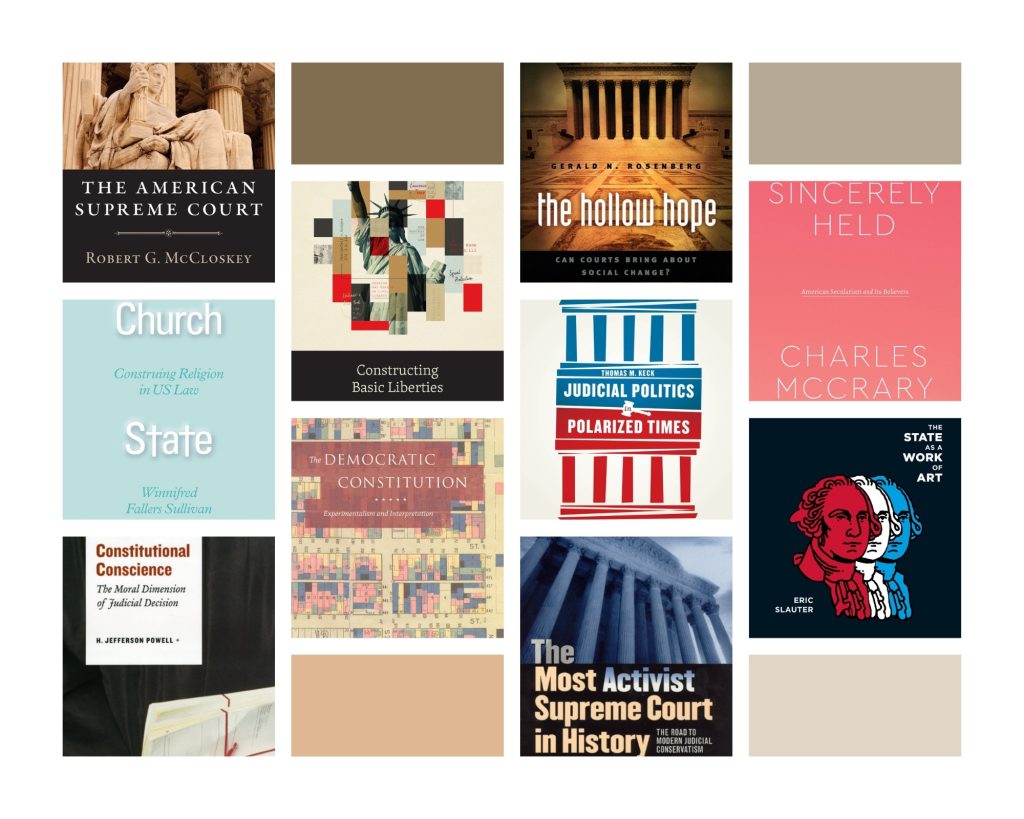A Supreme Court Reading List

University Presses like Chicago are committed to making available works that not only keep us informed but also help us to better understand our world, government, and laws. We have put together a reading list of books from Chicago that help illuminate different aspects of the Supreme Court of the United States.
The American Supreme Court, Sixth Edition
Robert G. McCloskey and Sanford Levinson
“The classic account of the American Supreme Court by the mid-twentieth century’s most astute student of American constitutionalism updated by the early twenty-first century’s most astute student of American constitutionalism. This is the first work constitutional beginners should—and constitutional scholars do—turn to.”—Mark Graber, University of Maryland School of Law
Church State Corporation: Construing Religion in US Law
Winnifred Fallers Sullivan
“In this polemical yet scholarly tour de force, Sullivan interrogates the U.S. Supreme Court’s rulings in recent major religious freedom cases on theological and legal grounds.”—Journal of American History
Constitutional Conscience: The Moral Dimension of Judicial Decision
H. Jefferson Powell
“An erudite and stimulating work, rich in insight. It makes innovative use of history, philosophy, law, and political science. . . . [Powell’s] identification and elaboration of interpretive virtues is an original and important contribution that will have significance for jurisprudence and constitutional law well beyond the United States.”—Law and Politics Book Review
Constructing Basic Liberties: A Defense of Substantive Due Process
James E. Fleming
“In Constructing Basic Liberties, James Fleming offers a powerful and persuasive defense of the much-maligned Supreme Court practice of recognizing unenumerated rights under the aegis of ‘substantive due process.’ Cases recognizing such rights as contraception, abortion, and same-sex marriage do not, as conservatives claim, augur the end of legislation based on morality, nor do they simply substitute judicial values for popular ones. Responding to progressives who would relocate rights in equal protection, Fleming also explains how equality should complement rather than supplant liberty. Even if the Trump-packed high court overrules Roe v. Wade, protection for a domain of what Fleming aptly terms ‘personal self-government’ likely will and certainly should remain a durable feature of American constitutionalism.”—Michael C. Dorf, Cornell Law School
The Democratic Constitution: Experimentalism and Interpretation
Brian E. Butler
“Dominant paradigms of political and legal theory have not been able to identify the best relationship between constitution in theory and democracy in practice, evident in the way judicial supremacy over constitutional interpretation goes almost unquestioned. Butler tackles this difficult philosophical issue with his own systematic legal experimentalism, guiding readers through dozens of Supreme Court cases across two centuries to show where the dominant paradigms require supplementation or replacement. The book will be a lightning rod for rival theories, but even scholars beholden to competing paradigms will appreciate how carefully Butler arrives at his conclusions.”—John Shook, University at Buffalo, SUNY
The Hollow Hope: Can Courts Bring About Social Change? Second Edition, Second Edition
Gerald N. Rosenberg
“Rosenberg argues with considerable subtlety and power and no little persuasiveness that the promise of Supreme Court action has been chimerical. In his view, Justices are, at best, the Rosencrantzes and Guildensterns of the larger American social drama, and the lawyers pleading their cases have mostly been wasting their thespian talents.”—David L. Kirp, Nation
Judicial Politics in Polarized Times
Thomas M. Keck
“Drawing on a sweeping survey of litigation on abortion, affirmative action, gay rights, and gun rights across the Clinton, Bush, and Obama eras, Keck argues that, despite judges’ claims, actual legal decisions are not the politically neutral products of disembodied legal texts. But neither are judges ‘tyrants in robes,’ undermining democratic values by imposing their own preferences. Ultimately, Keck concludes, judges respond not simply as umpires, activists, or political actors, but in light of distinctive judicial values and practices.”—Law and Social Inquiry
The Most Activist Supreme Court in History: The Road to Modern Judicial Conservatism
Thomas M. Keck
“[Keck] places the decisions of the Supreme Court in broad historical perspective and shows how the recent conservative activism of the Rehnquist Court fits within an unbroken activist tradition. . . . If you read just one book on the history of the modern Supreme Court, this should probably be the one.”—Choice
Sincerely Held: American Secularism and Its Believers
Charles McCrary
“McCrary casts this complex subject in a new light. Readers will gain valuable insights into the politics of religion in America.”—Publishers Weekly
The State as a Work of Art: The Cultural Origins of the Constitution
Eric Slauter
“[A] richly imaginative book. . . . Slauter’s book is the first full-scale effort by a literary scholar to bring to bear the special tools of his discipline on the Constitution and its cultural origins.”—Gordon S. Wood, The New Republic
All of these books are available from our website or your favorite bookseller.